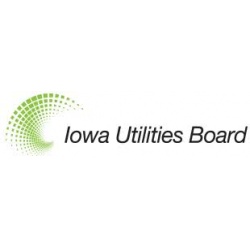
Ask Mr. Answer Person: Several questions about past electric utility municipalization efforts in Iowa
Dear Mr. Answer Person: "I'm wondering how many Iowa towns/cities have applied to the Iowa Utilities Board to convert to a municipal utility during, say the last 40 years? Of those, how many were approved and how many were denied? For both approved and denied, how did their statistics compare to Decorah's? And of those denied, what were the reasons for denial?"
Mr. Answer Person says, "Your very good questions kept Mr. Answer Person chained to his desk, away from idle activities like drinking coffee--so thanks!
Let's start with the last successful creation of a municipal electric utility in Iowa. According to the Iowa Association of Municipal Utilities, that would be Aurelia, Iowa in 1973, 45 years ago.
It's a little harder to come up with a list of unsuccessful attempts to create a municipal utility, but let's discuss two of them.
In 2005, Iowa City voters were asked to approve a proposal to create a municipal electric utility. On November 8th of that year, over 13,000 votes were cast on that referendum. There were 4,402 "yes" votes and 8,766 "no" votes, so the referendum failed by a two-to-one margin. It should be noted that during that campaign MidAmerican Energy spent $527,000 to defeat the ballot measure, while the citizens group supporting the measure spent $20,000.
In 2008, five communities with a combined population of just over 5,000 people applied to the Iowa Utilities Board for permission to establish a municipal electric utility. Alliant Energy has been stressing the word "five," but these very small communities (three of which have a population less than 600) applied together, so it was one application. The Iowa Utilities Board rejected the application because, "the Cities did not offer sufficient, reliable evidence to persuade the Board that they had the ability to successfully address all the issues that come with owning and managing a municipal electric utility. The Board acknowledges that many municipal utilities provide a high level of service, but the record did not establish that the Cities would be able to furnish adequate and reasonable service from the first day of operation. The Board does not doubt that the Cities could learn to run safe and efficient electric utilities, but the Board cannot approve a process of learning on the job. The Cities needed to show they had a reasonable plan ready to implement."
At the same time, as part of its decision, the Iowa Utilities Board specifically rejected the "slippery slope" arguments presented by Interstate Power and MidAmerican, writing in its decision, "that is, that if a few cities are permitted to municipalize, others will follow suit, ultimately gutting the company. Each municipalization case must be judged on its merits and the Board will not attempt to forecast what other municipalities might do or decide these cases based on such a forecast."
So there you have it! You've asked for answers and they've probably just created more questions for you. That's because there's no "right" position on this question…and no "wrong" position. You'll just have to weigh the facts and consider which ones are more important to you."
Site designed and maintained by Iroc Web Design Services©.
Your Small Business Web Design Solutions.™


